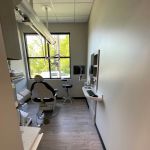Orthodontic Treatments for Overbite Correction: Effective Solutions for a Balanced Smile
- What is an Overbite?
- Why Correcting an Overbite is Important
- Orthodontic Treatments for Overbite Correction
- Types of Braces for Overbite Treatment
- Getting Started with Overbite Treatment
What is an Overbite?
An overbite occurs when the upper front teeth overlap the lower front teeth excessively, leading to misalignment in the bite. It’s one of the most common dental issues and can range from mild to severe. While a slight overbite might not cause significant problems, more pronounced cases can lead to issues such as difficulty chewing, jaw pain, and even self-esteem concerns due to the appearance of the teeth.
Overbites are often hereditary, but they can also result from habits like thumb-sucking during childhood, prolonged use of pacifiers, or early loss of baby teeth. Fortunately, orthodontic treatments for overbite correction can help restore a balanced smile and prevent the long-term dental problems that may arise from an untreated overbite.
Why Correcting an Overbite is Important
Correcting an overbite is essential for both aesthetic and health reasons. Overbites can cause wear and tear on the teeth, leading to enamel erosion and even tooth decay. Additionally, an improper bite can place excessive pressure on the jaw, potentially leading to temporomandibular joint (TMJ) disorders, headaches, and neck pain.
Beyond the physical discomfort, a pronounced overbite can also affect self-confidence and self-esteem, especially in social and professional situations. By addressing an overbite early, individuals can avoid future dental complications and improve their overall appearance and oral health.
Orthodontic Treatments for Overbite Correction
Orthodontic treatments for overbite correction focus on realigning the teeth and jaw to create a more functional and aesthetically pleasing bite. Several options are available depending on the severity of the overbite, the patient's age, and their specific needs:
- Braces: Traditional braces are the most common and effective treatment for correcting an overbite. They gradually shift the teeth into proper alignment using brackets and wires.
- Clear Aligners: Clear aligners like Invisalign offer a more discreet option for overbite correction. They work similarly to traditional braces but are removable and less noticeable.
- Retainers: In some cases, a retainer might be used after braces to maintain the new position of the teeth and prevent the overbite from returning.
- Surgical Options: In severe cases, orthodontic surgery may be necessary to correct a significant overbite, particularly if it’s caused by misalignment in the jawbone.
The treatment plan will vary based on the specific needs of each patient, with orthodontists carefully evaluating the degree of the overbite and recommending the most appropriate solution.
Types of Braces for Overbite Treatment
Braces are one of the most common and effective ways to correct an overbite. There are several types of braces to choose from, each with its own benefits:
- Traditional Metal Braces: These are the most commonly used braces, featuring metal brackets and wires. They are highly effective for treating overbites and other dental misalignments.
- Ceramic Braces: Ceramic braces work similarly to metal braces but use clear or tooth-colored brackets, making them less noticeable.
- Lingual Braces: Lingual braces are placed on the inside of the teeth, making them invisible from the outside. They are a good option for those who prefer a more discreet treatment.
Your orthodontist will help determine which type of braces is best for your overbite based on factors such as your lifestyle, the severity of the overbite, and your preferences for visibility and comfort.
Getting Started with Overbite Treatment
If you're considering orthodontic treatments for overbite correction, the first step is to schedule a consultation with an experienced orthodontist. During this appointment, the orthodontist will assess your overbite, take X-rays or impressions of your teeth, and discuss the most suitable treatment options for you. They will also explain the timeline for treatment and any necessary follow-up visits.
Once treatment begins, it’s important to follow your orthodontist's instructions carefully to ensure the best results. Consistent care, including regular checkups, proper cleaning, and adhering to dietary restrictions, will help you achieve the desired outcome and improve your smile.







 Southcoast Endodontics5.0 (4 review)
Southcoast Endodontics5.0 (4 review) Flanders Pediatric Dentistry4.0 (210 review)
Flanders Pediatric Dentistry4.0 (210 review) OC Centers for Oral Surgery & Dental Implants - San Clemente5.0 (199 review)
OC Centers for Oral Surgery & Dental Implants - San Clemente5.0 (199 review) Kimberly Blaser, DDS5.0 (45 review)
Kimberly Blaser, DDS5.0 (45 review) Crown Point Dental Care4.0 (453 review)
Crown Point Dental Care4.0 (453 review) Metro Smiles Gage Park2.0 (36 review)
Metro Smiles Gage Park2.0 (36 review) The Importance of Oral Health Education During Pregnancy for a Healthy Pregnancy
The Importance of Oral Health Education During Pregnancy for a Healthy Pregnancy Best Tips for Brushing Your Teeth Properly for Healthy Gums: Essential Techniques for Oral Health
Best Tips for Brushing Your Teeth Properly for Healthy Gums: Essential Techniques for Oral Health Why Skipping Dental Checkups Can Lead to Bigger Oral Health Problems
Why Skipping Dental Checkups Can Lead to Bigger Oral Health Problems Advantages of Porcelain Dental Restorations
Advantages of Porcelain Dental Restorations How Can Diabetes Cause Tooth and Gum Problems? Preventing and Managing Oral Health Issues
How Can Diabetes Cause Tooth and Gum Problems? Preventing and Managing Oral Health Issues Healthy Habits for Promoting Good Oral Health and Hygiene: Tips for a Healthy Smile
Healthy Habits for Promoting Good Oral Health and Hygiene: Tips for a Healthy Smile